The flute might be perfect for you if you're looking for a rewarding and versatile instrument. With its rich history and various types, like the concert and piccolo, you'll find an option that suits your taste. Playing the flute enhances lung capacity, reduces stress, and fosters social connections through music. While there's a learning curve, with dedication and regular practice, you can master it. Flute music spans multiple genres, from classical to jazz, making it a fun exploration. Interested in finding the right flute for your journey? There's much more to discover about starting your musical adventure.
Key Takeaways
- The flute offers a rewarding musical experience, enhancing creativity and self-expression for beginners interested in learning an instrument.
- Playing the flute promotes health benefits, including improved lung capacity and stress reduction through mindful breathing techniques.
- Regular practice is essential for mastering the flute; establishing a consistent routine of 20-30 minutes daily leads to better skill development.
- The flute is versatile across genres, including classical, jazz, and world music, allowing beginners to explore diverse musical traditions.
- Choosing the right flute based on material and design features is crucial for comfort and sound quality, ensuring a positive learning experience.
Understanding the Flute
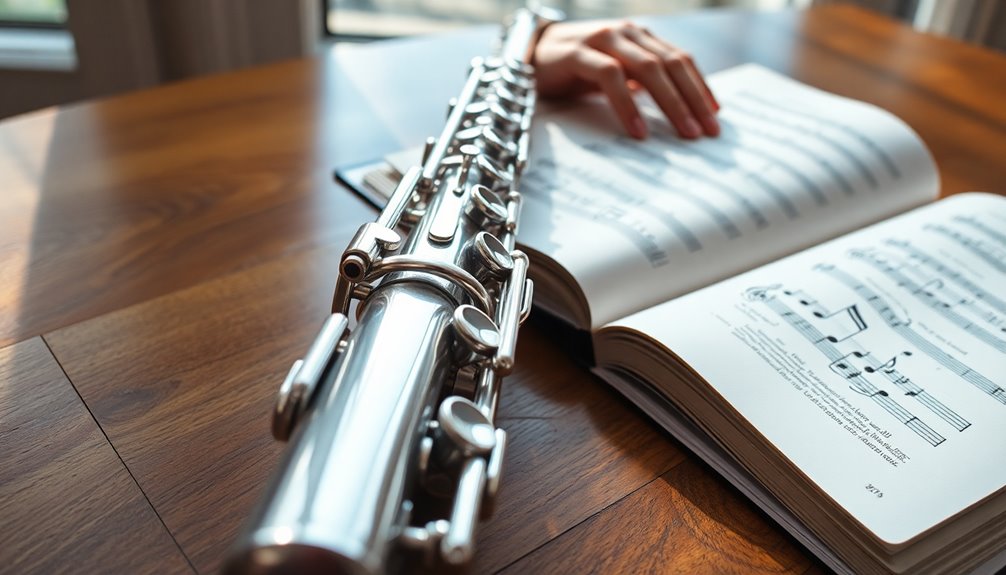
When you immerse yourself in the world of the flute, you'll find it a fascinating instrument with a rich history and diverse range of sounds. The flute's journey began thousands of years ago, with early versions crafted from materials like wood and bone.
As you explore flute history, you'll discover that it has evolved considerably, influencing various musical cultures across the globe. From the simple wooden flutes of ancient civilizations to the modern metal flutes used today, each iteration tells a story of innovation and artistry.
Understanding flute construction is equally important. Modern flutes are typically made of metals such as silver, gold, or nickel, and feature a series of keys and pads that allow for precise sound production.
The body is usually cylindrical, which contributes to the instrument's unique tonal qualities. As you dig deeper, you'll learn about the different types of flutes, including concert, piccolo, and alto flutes, each offering distinct sounds and playing techniques. Additionally, each flute type, such as the Western Concert Flute, showcases a variety of expressive possibilities, making it suitable for different genres.
Benefits of Playing the Flute
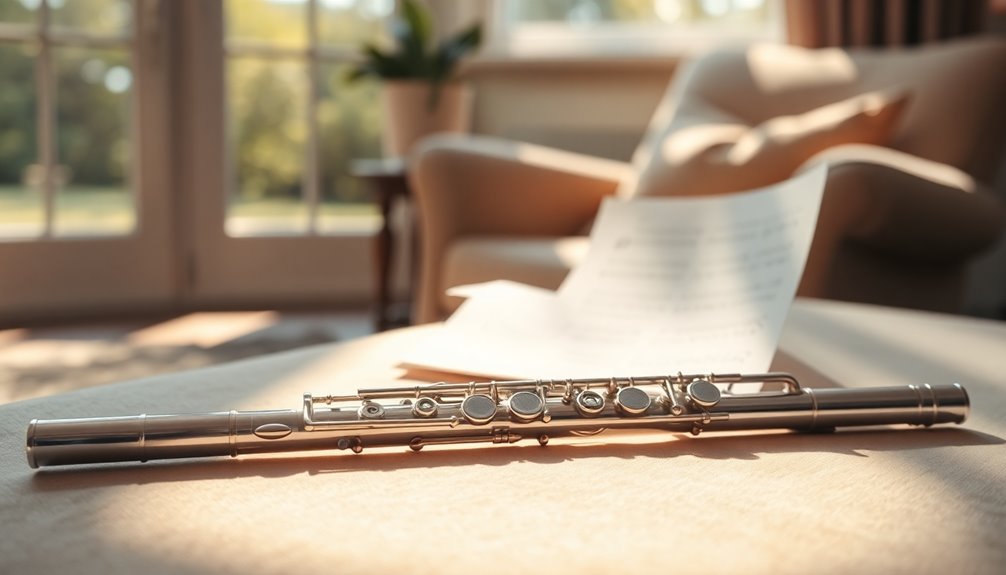
Playing the flute offers a wealth of benefits that extend beyond just creating beautiful music. For starters, it provides excellent health benefits. When you play, you engage in deep breathing, which can improve your lung capacity and overall respiratory health. This mindful breathing can also reduce stress, promote relaxation, and enhance your mental well-being. As you focus on your music, you'll find it a great way to unwind and recharge. Additionally, mastering breath control through diaphragmatic breathing enhances your tone quality and fosters a richer musical experience.
Additionally, playing the flute fosters social connections. Whether you join a band, participate in school ensembles, or simply jam with friends, you'll have plenty of opportunities to connect with others who share your passion for music. These interactions can lead to lasting friendships and a sense of belonging, making your musical journey even more rewarding.
Moreover, mastering the flute instills a sense of discipline and patience. As you practice and improve, you'll experience a boost in self-confidence, which can positively influence other areas of your life. Learning to play an instrument is a fulfilling challenge that promotes personal growth.
Flute Types and Features
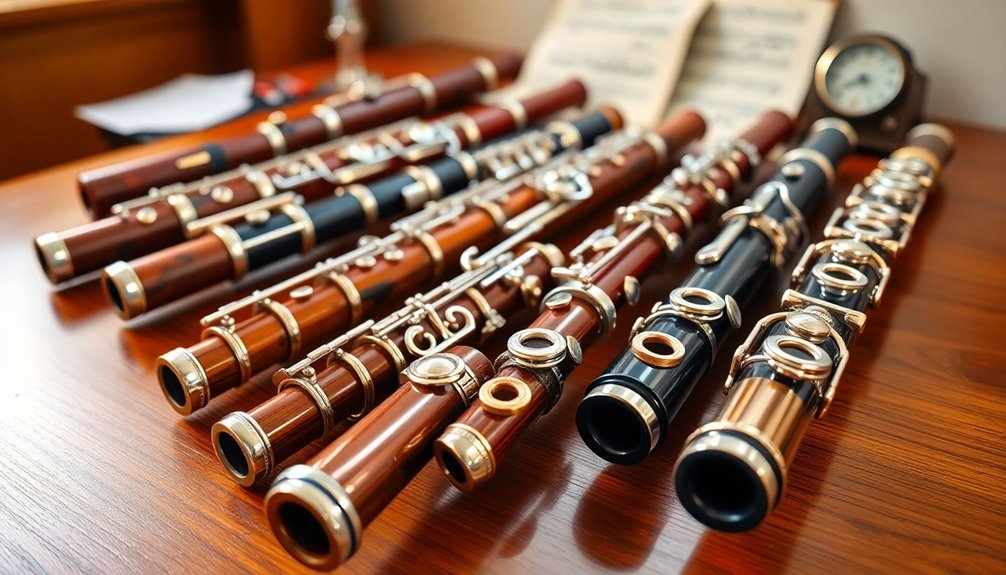
Flutes come in various styles and are made from different materials, each offering unique sound qualities and playability. Here's a quick overview of some common flute types that are great for beginners:
- Concert Flutes: Typically made of silver or nickel, these flutes are the most common. They produce a clear, bright sound and are widely used in orchestras and bands. They're excellent beginner flutes due to their versatility and availability.
- Piccolo: This smaller version of the concert flute plays an octave higher. While it's not usually a first choice for beginners, it can be a fun addition once you're comfortable with playing the flute.
- Wooden Flutes: Made from various hardwoods, these flutes offer a warm, rich tone. While they can be more challenging to maintain, they're a beautiful option for those looking to explore different sound textures.
When choosing your flute, consider the flute materials and how they affect sound quality and durability. A beginner flute in a durable material can withstand the rigors of learning while still sounding fantastic. Additionally, many beginners find success with reputable brands that focus on quality construction and playability. Embrace this exciting journey, and remember that finding the right flute is key to your musical growth!
Learning Curve and Commitment
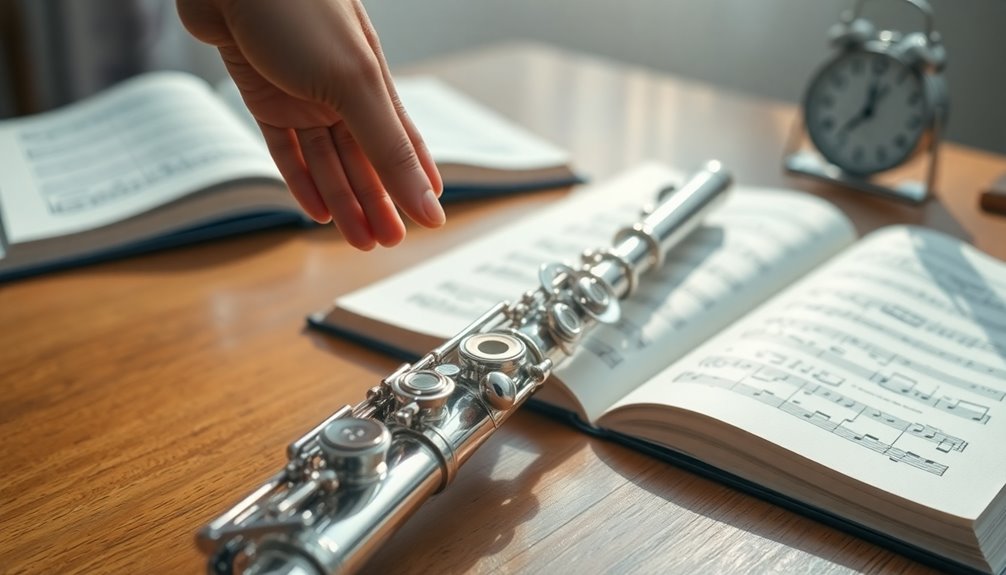
Starting on your flute journey involves embracing a learning curve that can be both exciting and challenging. As you pick up your flute for the first time, you'll quickly realize that mastering this beautiful instrument takes dedication and patience.
You'll encounter new skills, from producing your first note to developing your breath control and finger techniques. Each step will contribute to your growth as a musician, and you'll find joy in each small victory along the way.
Time commitment is essential to your progress. Setting aside regular practice sessions will help you build your skills effectively. Even short, focused practice techniques can lead to significant improvement.
A good starting point is to consider investing in a standard C flute, which is the most common choice for beginners and offers a balanced tone.
Aim for consistency rather than long hours; 20 to 30 minutes a day can be more beneficial than cramming in a few hours once a week. Establishing a routine won't only enhance your abilities but also make playing the flute a rewarding habit.
Musical Genres for Flute
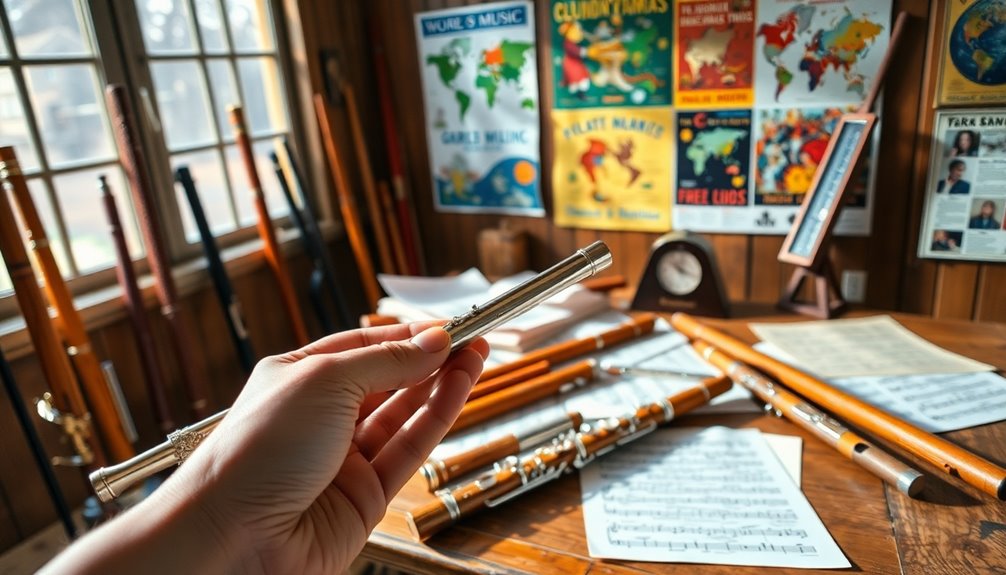
While exploring the world of flute music, you'll discover its versatility across various genres, each offering unique opportunities for expression.
Whether you're drawn to the intricate melodies of classical music or the lively rhythms of jazz, the flute can adapt beautifully to your musical preferences. Here are three popular genres where the flute shines:
1. Classical Repertoire: The flute has a rich history in classical music, featuring prominently in compositions from renowned composers like Mozart and Bach.
You'll find its sweet sound complements orchestras and chamber groups, allowing for both solo and ensemble performances.
2. Jazz Influences: If you enjoy improvisation and rhythmic complexity, jazz is an exciting genre to explore with the flute.
Many contemporary jazz musicians incorporate the flute into their ensembles, creating a unique blend of sounds that can be both soothing and energetic.
You'll find that the freedom to improvise allows for personal expression and creativity.
3. World Music: The flute is a staple in many cultures around the globe.
From the bamboo flutes of Asia to the Native American flute, you can immerse yourself in diverse musical traditions.
This genre encourages exploration and connection with various cultures, enriching your musical journey. Additionally, the flute's role in traditional folk music showcases its ability to convey cultural storytelling and heritage, further enhancing its versatility.
No matter which genre you choose, the flute offers endless possibilities for growth and connection.
Embrace the adventure and let your passion guide you as you navigate through the beautiful world of flute music!
Choosing the Right Flute for You
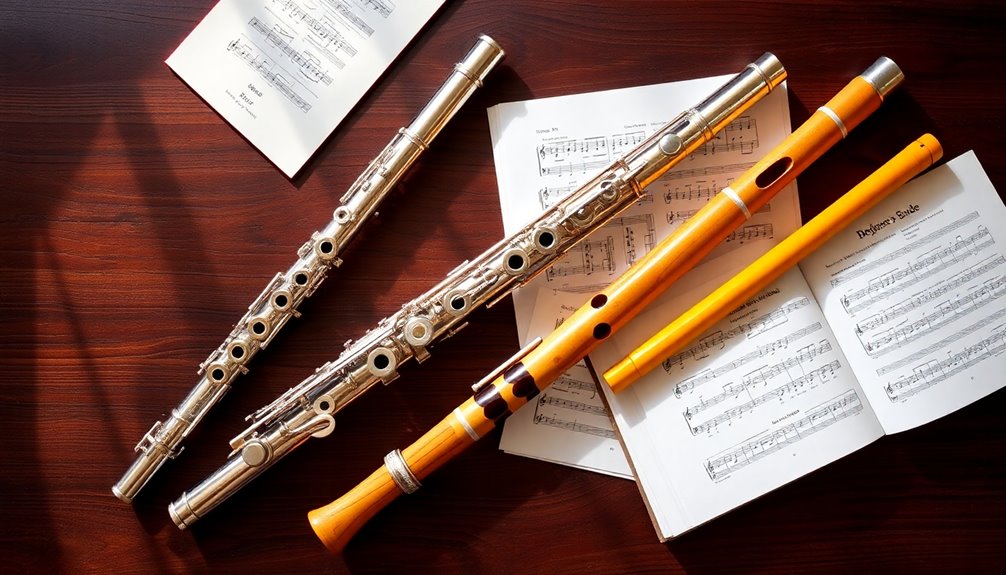
When it comes to choosing the right flute for you, understanding your needs and preferences is essential. Start by considering your skill level. If you're a beginner, a student model made from silver-plated nickel is often a great choice. These flutes are affordable, durable, and produce a warm sound.
More experienced players might lean towards flutes made from solid silver or even gold, which offer richer tones and greater responsiveness.
Next, think about the flute brands available. Popular options like Yamaha, Gemeinhardt, and Pearl have established reputations for quality and craftsmanship. Researching these brands can help you find a flute that suits your playing style and budget.
Don't hesitate to visit local music stores or online retailers to get a feel for different models.
Another key factor is the flute's design features. Consider whether you prefer an open or closed hole flute. Closed hole flutes are typically easier for beginners, while open hole flutes offer more advanced techniques and tonal flexibility.
Additionally, check out the type of keys and whether they're offset or inline, as this can affect your comfort and playing efficiency. Understanding the impact of key systems and mechanisms can also help in making an informed decision.
Ultimately, choosing the right flute is about finding the perfect blend of materials, brand, and design that resonates with you. Trust your instincts, and don't rush the process.
Connecting with the right instrument can enhance your musical journey and help you feel a sense of belonging in the world of music.
Frequently Asked Questions
Can Children Start Learning the Flute at a Young Age?
Absolutely, children can start learning the flute at a young age!
The flute offers numerous benefits, such as enhancing coordination and boosting creativity. It fosters child engagement, encouraging them to express themselves musically.
Starting early allows them to develop their skills gradually, making it easier to master the instrument. Plus, learning music together can create a sense of belonging and community, enriching their social experiences.
Embrace the journey and watch your child flourish!
How Much Does a Beginner Flute Cost on Average?
A beginner flute typically costs between $100 and $400.
If you're looking to save money, consider flute rental options or buying used instruments. Rentals often provide a low-cost way to start, letting you test the waters without a big commitment.
Buying a used flute can also be a great deal; just verify it's in good condition.
With these choices, you can find a flute that fits your budget and helps you belong in the music community.
What Accessories Do I Need for Playing the Flute?
To get started with your flute, you'll need some essential flute accessories.
A cleaning rod and cloth are crucial for proper flute maintenance, helping you keep your instrument in top shape.
Consider a flute case for protection and a metronome to improve your timing.
Don't forget a tuner to guarantee you're playing in pitch.
With these accessories, you'll not only enhance your playing experience but also feel more connected to the music community!
Are There Online Resources for Learning Flute Techniques?
Absolutely, there are plenty of online resources for learning flute techniques!
You can find excellent online tutorials that break down everything from basic finger positioning to advanced breathing techniques. Video lessons are also a great way to see techniques in action, making it easier to follow along.
Joining online communities can provide support and encouragement as you progress, helping you feel connected with fellow learners.
Immerse yourself and start exploring these resources today!
How Often Should I Practice to Improve My Flute Skills?
Think of your flute practice like watering a plant; consistency helps it flourish. To improve your skills, aim for at least 20-30 minutes daily.
Create a practice schedule that includes warm-ups, technique exercises, and songs you love. Mix in improvement tips like recording yourself or playing with others to keep things fresh and engaging.
Conclusion
In the enchanting domain of music, the flute stands out as a graceful companion for your journey. Whether you're drawn to its soothing tones or the joy of creating melodies, embracing this instrument can be a delightful adventure. While the road to mastery may have its twists, the rewards of expression and connection are truly priceless. So, if you're ready to take a step into this melodious sphere, the flute might just be your perfect match.






